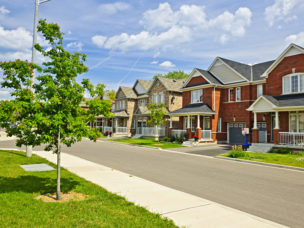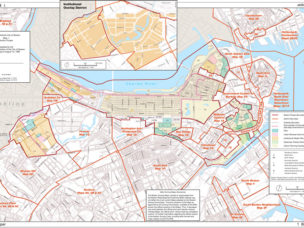Stay in the know
Subscribe to the Real Estate Blog and we’ll send you an email each time something new is posted.
Subscribe to the Real Estate Blog and we’ll send you an email each time something new is posted.
Blogs
Real Estate Blog
MBTA Communities Act: Next Steps
Massachusetts SJC Upholds MBTA Communities Act on Constitutional Grounds, but Rules Ineffective on Procedural Grounds
Background
If you already have the background, please jump to the end of this article for a discussion of next steps.
The MBTA Communities Act (“§ 3A” or the “Act”) was established in response to the ongoing housing crisis in Massachusetts.[1] Among other things, the law requires cities and towns with access to MBTA services to implement zoning laws that allow for at least one district of multifamily housing “as of right” near local MBTA stations.[2] Under § 3A, each MBTA community[3] must maintain multifamily housing districts of “reasonable size,” in addition to other requirements set forth in the statute: such districts must meet a minimum gross density measurement of 15 units per acre; be located not more than 0.5 miles from an MBTA facility (commuter rail, subway, ferry, or bus station, as applicable); and must be suitable for families with children and must not contain age restrictions.[4]
MBTA communities that do not comply with § 3A are ineligible for certain State funding sources—such as the Housing Choice Initiative, the Local Capital Projects Fund, the MassWorks infrastructure program, and the HousingWorks infrastructure program—but notably, a municipality cannot simply choose not to comply with § 3A.[5] The plain language of the statute requires compliance: “municipalities shall have a zoning ordinance or by-law that provides for [multifamily housing as of right].”[6]
The town of Milton had initially taken steps to comply with § 3A: its planning board had discussed implementation, it received grant money to hire a design consultant to create a zoning plan, and submitted its “action plan” to the Executive Office of Housing and Livable Communities (HLC) seeking a determination of “interim compliance” with § 3A.[7] In February of 2024, however, Milton held a referendum, and the voters rejected the proposed zoning plan by a margin of 8%. Thereafter, the Attorney General filed its complaint against the town to enforce compliance with § 3A.
The Supreme Judicial Court’s January 8, 2025 Decision
In Attorney General v. Town of Milton, et al., the town’s position was threefold: that § 3A “provides for an unconstitutional delegation of legislative authority, that the Attorney General lacks the power to enforce the [A]ct, and that HLC’s guidelines were not promulgated in accordance with the [Administrative Procedure Act (APA)].”[8]
First, Milton argued that § 3A is legally ineffective because the HLC failed to implement the Act in accordance with the APA.[9] The Court agreed, citing the central function of the APA—G. L. c. 30A—which is to “establish a set of minimum standards of fair procedure below which no agency should be allowed to fall and to create uniformity in agency proceedings.”[10] In response, the Attorney General contended that HLC is exempt from the APA procedure because 30A “directs the agency to promulgate ‘guidelines’ rather than ‘regulations.’” Even if the APA applied, the Attorney General argued, the HLC nonetheless substantially complied with the statute and any omissions were therefore harmless.[11] The Court rejected both arguments: “Given the breadth, detail, substance, and mandatory requirements of the HLC guidelines . . . we reject the agency’s position that the ‘guidelines’ . . . are meant to be exempt from the APA[.]”[12] Here, the guidelines direct HLC to create compliance parameters for MBTA communities, such as detailing what is needed to achieve a “reasonably sized” zoning district. Moreover, the guidelines set forth the manner by which the HLC determines density requirements and whether all of a community’s multifamily housing must be situated within one-half mile of the designated § 3A MBTA facility. Finally, the guidelines define and establish the application process for “as of right” zoning of multifamily housing near MBTA facilities.[13] Taken together, the Act’s “guidelines” fall within the scope of 30A and must, therefore, be promulgated pursuant to the APA’s requirements. 30A, §5 requires agencies engaged in the rulemaking process to, among other requirements, file notice of proposed regulation—which includes a notice of public hearing—with the Secretary of the Commonwealth, along with a small business impact statement, both of which HLC admitted it did not do.[14] The APA leaves no room for “substantial compliance,” but rather strict compliance is required for agencies promulgating rules under 30A.[15] Notably, it also appeared that HLC failed to file a fiscal impact statement with the Secretary of the Commonwealth, which is also required by 30A. The Court, concluding, stated “because HLC failed to comply with the APA, HLC’s guidelines are legally ineffective and must be repromulgated in accordance with G. L. c. 30A, § 3, before they may be enforced.”[16]
Second, Milton argued the Legislature’s delegation of authority to the HLC violated the separation of powers doctrine because § 3A gives HLC the power to require “transformative zoning changes” in MBTA communities.[17] The Court rejected the town’s position based on three factors: first, the Legislature routinely assigns to others the implementation of a policy adopted by statute; second, the Act provided “intelligible” parameters to allow the HLC to make determinations as to whether an MBTA community was in compliance with the Act; and finally, under § 3A, the HLC was guided by principles of reasonableness as well as content limitations, and the Act required the HLC’s consultation with other State agencies in the promulgation of its guidelines, which “sufficiently demarcate[s] the boundaries of regulatory discretion.[18]
Finally, Milton argued the Attorney General could not enforce § 3A because there was no explicit grant of authority in the act, but the court rejected such reasoning, citing the Attorney General’s broad power to enforce the laws of the Commonwealth in addition to the Attorney General’s duty to “represent the public interest and enforce public rights.”[19] Moreover, the fact that § 3A already included consequences for noncompliance—e.g. lack of certain funding opportunities—does not foreclose the Attorney General’s power to enforce equitable relief particularly where, as here, “converting [the] legislative mandate into a matter of fiscal choice” would frustrate the Legislature’s purpose in adopting the statute.[20]
Next Steps
Multiple sources have reported on Governor Healey’s intention to have the HLC file new emergency regulations by the end of the week. While the emergency regulations would be effective immediately upon filing, it is unclear what alternate compliance deadline(s) might be established on municipalities or whether new emergency guidelines would face a court challenge for violating the APA, particularly if the filing by HLC is a perfunctory compliance with the APA procedural requirements only. The establishment of new compliance deadlines is politically sensitive: very near term deadlines could be deemed punitive, whereas distant deadlines could be viewed as accommodating the communities which have not been prompt to comply. Although 30A, § 2(5) states that emergency regulations shall not remain in effect for longer than three months, an agency may prolong such three-month period if during that time it gives notice and holds a public hearing, and files notice of compliance with the Office of the Secretary of State.
[1] See Multi-Family Zoning Requirement for MBTA Communities, Mass.gov (Nov. 22, 2024), https://www.mass.gov/info-details/multi-family-zoning-requirement-for-mbta-communities.
[2] See Compliance Guidelines for Multi-family Zoning Districts Under Section 3A of the Zoning Act, Commonwealth of Mass. Exec. Off. Hous. & Livable Cmtys. (revised Aug. 17, 2023), https://www.mass.gov/doc/compliance-guidelines-for-multi-family-zoning-districts-under-section-3a-of-the-zoning-act/download [hereinafter Compliance Guidelines].
[3] See id. at 4 (An “MBTA community” is “one of the ‘14 cities and towns’ that initially hosted MBTA service; one of the ‘51 cities and towns’ that also host MBTA service but joined later; other ‘served communities’ that abut a city or town that hosts MBTA service; or a municipality that has been added to the MBTA under G.L. c. 161A, sec. 6 or in accordance with any special law relative to the area constituting the authority.”).
[4] See id. at 1.
[5] See Attorney General v. Town of Milton, et al., SJC No. 13580, slip op. at 6, n.6 (Mass. Jan. 8, 2025).
[6] See Compliance Guidelines, supra note 2, at 1.
[7] See Milton, slip op. at 7.
[8] See id. at 9.
[9] See id. at 18.
[10] See id. (internal citations and quotations omitted).
[11] See Attorney General v. Town of Milton, et al., SJC No. 13580, slip op. at 19 (Mass. Jan. 8, 2025).
[12] See id. at 19-20.
[13] See id. at 19-20.
[14] See id. at 21.
[15] See Milton, slip op. at 21-22 (internal citations and quotations omitted).
[16] See id. at 22.
[17] See Attorney General v. Town of Milton, et al., SJC No. 13580, slip op. at 9 (Mass. Jan. 8, 2025).
[18] See id. at 10-13.
[19] See id. at 9, 14-16.
[20] See id. at 14-15.





